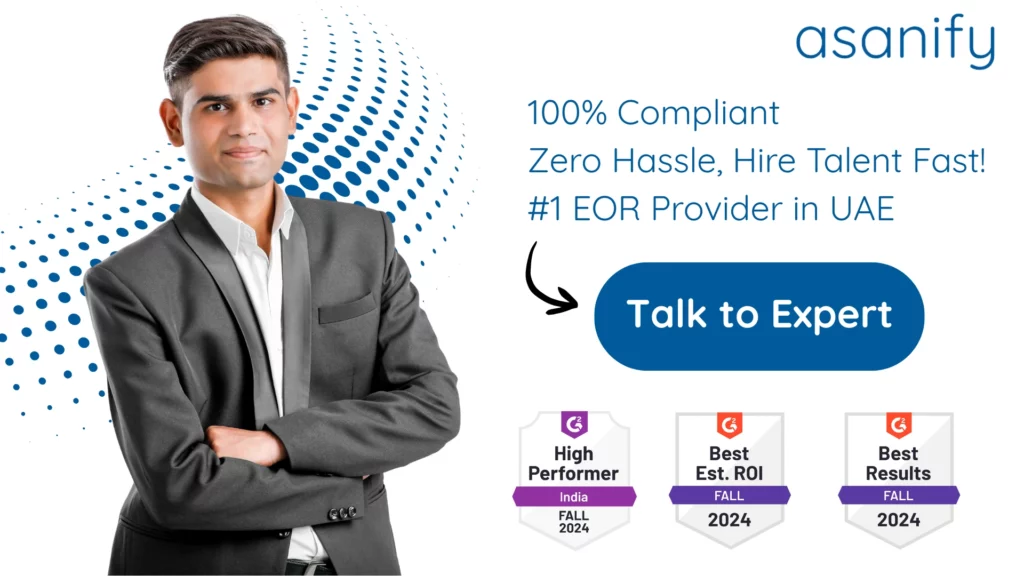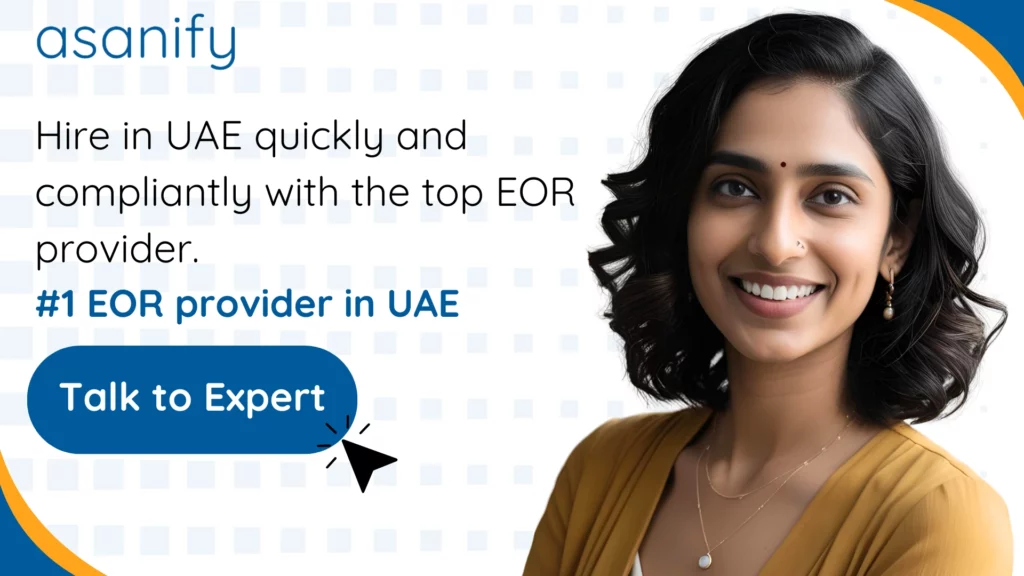The United Arab Emirates (UAE) is a top destination for global business expansion, offering pro-business regulations, a strategic location, and access to skilled talent across fintech, SaaS, energy, and healthcare. Key cities like Dubai and Abu Dhabi attract remote professionals, but hiring in the UAE is complex. Employers must comply with strict labor laws, visa processes, WPS payroll mandates, and Emiratisation policies. To simplify remote hiring, many global companies rely on an Employer of Record (EOR) to manage legal employment, visa sponsorship, payroll, and compliance. This onboarding checklist ensures a smooth, legally compliant hiring experience.
Table of Contents
- Why Remote Employee Onboarding is Different in the UAE
- Pre-Onboarding Stage with EOR in UAE
- Onboarding Stage with EOR in UAE
- Post-Onboarding Compliance in the UAE
- Why Use an EOR for Remote Employee Onboarding in UAE
- Asanify’s Role in UAE Remote Onboarding
- Final Checklist for UAE Remote Employee Onboarding
- Conclusion
- FAQs
Why Remote Employee Onboarding is Different in the UAE
Hiring remote employees in the United Arab Emirates (UAE) involves a complex framework of legal, regulatory, and administrative requirements that go far beyond the basics of employment. Unlike other countries, the UAE enforces strict labor laws that demand full compliance at every stage of the hiring and onboarding process. From drafting bilingual Arabic-English employment contracts to ensuring payroll is processed through the Wage Protection System (WPS), every step must align precisely with UAE Labor Law and relevant Free Zone or mainland regulations.
In addition, companies must navigate several non-negotiable requirements, including:
- Mandatory medical insurance for all employees, which must be in place before visa issuance
- Emirates ID registration and labor card processing, which are essential for legal employment
- Sector-specific Emiratisation quotas that apply to certain industries and company sizes
- Arabic language contracts approved by the Ministry of Human Resources and Emiratisation (MOHRE) or relevant Free Zone authority
For companies without a local legal entity, partnering with an Employer of Record (EOR) eliminates the need for on-the-ground infrastructure. An EOR ensures full compliance with local labor laws, handles visa sponsorship, processes WPS-compliant payroll, and manages documentation—allowing businesses to hire remote talent in the UAE quickly, legally, and efficiently.
Suggested Read: Pay Contractors in Dubai: The Ultimate Hiring Guide
Pre-Onboarding Stage with EOR in UAE
1. Candidate Verification and Background Check
The EOR begins by verifying the candidate’s academic qualifications, previous employment, and any criminal history as per UAE immigration standards.
2. Finalizing Job Offer and Salary Structure
This includes determining the gross salary, allowances (like housing or transport), bonus structure, and benefits like end-of-service gratuity.
3. Drafting MOHRE-Compliant Employment Contracts
The EOR issues bilingual (Arabic-English) employment contracts that comply with the UAE Labor Law and are approved by relevant Free Zone or mainland authorities.
4. Role Clarity and Expectation Setting
Before Day 1, the company must define KPIs, working hours, probation period terms, and performance expectations.

Onboarding Stage with EOR in UAE
5. Work Permit and Visa Processing
The EOR handles the entire visa cycle, including entry permit, medical fitness test, Emirates ID application, and labor card issuance.
6. Medical Insurance Enrollment
All employees must be covered under a valid UAE medical insurance plan, which the EOR facilitates prior to onboarding.
7. WPS-Compliant Payroll Setup
EORs ensure employee salaries are processed through the Wage Protection System, a UAE-mandated payroll compliance protocol.
8. Equipment & IT Access
Companies must arrange laptops, collaboration tools, VPNs, and secure login credentials to enable remote productivity from Day 1.
9. Welcome Kit and Orientation
Introduce the employee to the company’s values, culture, team members, and policies through a virtual onboarding session and welcome email kit.

Post-Onboarding Compliance in the UAE
10. Leave, Gratuity, and Time-Off Policies
UAE law mandates 30 calendar days of annual paid leave and end-of-service gratuity after one year of service. The EOR tracks and manages these entitlements.
11. Ongoing PRO and Visa Renewal Management
The EOR monitors document expiry dates and manages renewals for visas, Emirates IDs, and labor cards.
12. Employee Record Management and Reporting
The EOR maintains up-to-date employment records, including contracts, visa documentation, and payroll slips, stored securely for audits and inspections.
13. Feedback and Probation Review
A structured probation review process ensures alignment on performance expectations, with legal guidance from the EOR on extensions or exits.
Why Use an EOR for Remote Employee Onboarding in UAE
Using an Employer of Record (EOR) significantly simplifies remote employee onboarding in the UAE by eliminating the need to manage complex legal and operational tasks internally. Here’s how an EOR helps:
- No need to register a local entity
Avoid the time and cost of setting up a mainland LLC or Free Zone company. - Bypass immigration and visa bureaucracy
The EOR handles all visa applications, work permits, and Emirates ID processing. - No requirement to hire PRO services
Eliminate the need for local agents to manage document submissions to MOHRE or immigration authorities. - Streamlined payroll and benefits administration
The EOR manages WPS-compliant payroll, mandatory health insurance, and statutory benefits. - Full legal compliance assurance
The EOR stays up to date with UAE labor laws and handles audits, contract updates, and renewals.
By offloading these responsibilities, your business can focus on operations and growth while ensuring remote employees are onboarded legally and efficiently.
Asanify’s Role in UAE Remote Onboarding
Asanify’s EOR services make remote onboarding in the UAE smooth, compliant, and hassle-free. We handle every aspect—from drafting bilingual employment contracts to processing visas and Emirates IDs. Our team ensures full MOHRE and WPS compliance, sets up payroll and medical insurance, and provides real-time onboarding progress updates. With deep local expertise in UAE labor law, we help your remote employees stay compliant, secure, and productive from day one.

Final Checklist for UAE Remote Employee Onboarding
Here’s your quick-reference onboarding checklist to ensure nothing is missed:
✅ Candidate background verified
✅ Offer letter with salary structure finalized
✅ MOHRE-compliant bilingual contract issued
✅ Visa, Emirates ID, and labor card processed
✅ Health insurance coverage initiated
✅ WPS payroll account set up
✅ Laptop and tool access arranged
✅ Virtual orientation and HR documents shared
✅ Leave policies and probation terms explained
Use this onboarding checklist as a repeatable framework every time you onboard remote employees in the UAE with your EOR partner.
Suggested Read: Employer of Record UAE: A Comprehensive Guide 2025
Conclusion
Hiring remote employees in the UAE offers global businesses access to exceptional talent, but also comes with legal, payroll, and immigration complexities. A well-structured onboarding process is crucial to ensure compliance, avoid penalties, and create a positive employee experience. Partnering with an Employer of Record (EOR) like Asanify simplifies the entire journey—from contract drafting and visa processing to WPS-compliant payroll and benefit administration. Whether you’re scaling a tech team in Dubai or onboarding a remote analyst in Abu Dhabi, Asanify ensures your hiring is fast, compliant, and cost-effective. Use this onboarding checklist as your trusted framework for success.
FAQs
Typically, onboarding is completed in 10–15 business days with all legal steps handled by the EOR.
No, EORs allow you to hire without setting up a mainland or Free Zone entity.
Yes, Arabic labor contracts are required by UAE law and must be filed with MOHRE or the relevant authority.
Wage Protection System ensures legal, timely salary payments and is mandatory for payroll compliance in the UAE.
Yes, the EOR acts as the legal sponsor and manages visa, Emirates ID, and medical clearance.
Yes, it’s a legal requirement in UAE and must be arranged before the visa is issued.
Yes, leading EORs like Asanify operate in both mainland and Free Zone jurisdictions.
Bonuses, housing, transport, and other allowances can be added to the salary structure based on company policy.
The EOR supports conversion to permanent status and ensures legal updates to the employment contract.
Yes, gratuity (end-of-service benefit) is a legal entitlement after completing one year of service.
Absolutely. EORs are ideal for rapid team expansion without bureaucratic delays.
Asanify keeps all documentation aligned with UAE labor law and handles audits, renewals, and government filings.
Yes, they manage renewals, resignations, end-of-service calculations, and visa cancellations.
Not to be considered as tax, legal, financial or HR advice. Regulations change over time so please consult a lawyer, accountant or Labour Law expert for specific guidance.

